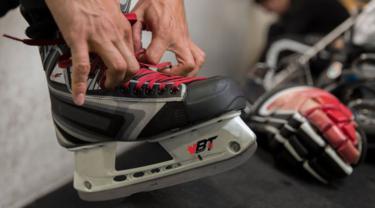Anthony Morra and Jeff Azzolin admit they haven’t taken the traditional route to exporting. What other Canadian startup can boast having 30 National Hockey League players on eight different teams using its product in just six months?
“Instead of trying to slug it out solely through the retail route, we focused on the Holy Grail,” said Morra, whose Toronto-based company, Bladetech Hockey makes the world’s only flexible skate blade, utilizing a proprietary Flex-Force technology. “We figured that validation from pro hockey players would unlock doors of opportunity.”
Finding the key to the lock was part of the export challenge the duo quickly learned. In hockey, players are always looking for a competitive edge. But it’s not as simple as calling up a pro NHL player and convincing him to try a product.
“The hockey community worldwide is very close knit,” said Morra. “Like any business, success hinges on the ability to establish and strengthen relationships. Those are the two biggest lessons we’ve learned.”
Bladetech’s solution was to target NHL team equipment managers, send them product samples and educate them on the competitive advantages Bladetech’s skate blades provide over traditional blades.
“We were instantly solving a problem (for them) by demonstrating our blades only need to be sharpened half as much as traditional blades,” Morra explained. “That definitely got their attention.”
Washington Capitals’ Equipment Manager Brock Myles said, “One thing I have noticed is the amount of blades that I have to change during games has drastically gone down. Players tell me they notice that the blades hold their edge longer and more thoroughly on their turns.”
Meanwhile, players immediately enjoyed Bladetech blade’s increased acceleration and overall efficiency as well as the added the health benefits of softening the wear and tear on joints in the knees and hips.
Dave Poulin, a retired Philadelphia Flyers’ player and current sports commentator, reinforced Morra’s claim.
“When I talk to teams and equipment managers, they tell me they are getting more efficient skating from their players using Bladetech blades,” he said. “They’re able to keep sharp edges without having too deep a hollow. It simply allows for a better glide.”
While still very early in the export journey, the company’s main market aside from Canada is south of the border. However, through its online store, the company has sold blades to customers in Europe and Japan. Bladetech has recently focused on the domestic retail market, striking deals with a major distributor.
“I think going global begins at home,” Morra says. “Before we really take on the world, we need to ensure we’ve really tested the domestic market.”
However, the duo plans to inject global vision into their Canadian excellence in the immediate future.
“It’s like we put the cart before the horse,” said Morra. “We are focusing on the NHL and as a result, the U.S. right now. But we plan to tackle any market where a steel blade hits the ice. We will be focusing on Europe in the next 18 months.”
And after that, China.
“Hockey is becoming huge over there,” Morra added. “They are putting a lot of money into the game and hiring a lot of Canadian coaches. China is something that’s definitely on our radar.”
In the competitive global economic arena, succeeding in the world’s largest market for hockey gear doesn’t ensure a monopoly.
“We may not be global, but that certainly doesn’t mean we don’t face global competition,” Morra said. “Some of our biggest emerging competitors are in Korea and Finland right now and we expect more. That’s why targeting the NHL was the main part of our business plan.”
Competition aside, Bladetch’s global journey will require an increased educational effort on the products’ benefits in addition to developing ‘on the ground’ relationships.
“Having NHL players using our blades will help on both fronts,” he added. “Even in beer leagues around the world.”
Being small has its advantages in the global arena, Morra explained. Selling a small number of units internationally is a great educational and trial run for when they are ready to really focus on the market.
The biggest lesson learned so far is developing relationships and face-to-face meetings.
“You can use all of the technology you want, but at the end of the day it comes down to the handshake,” he said. “We are selling a unique product that appeals to anyone who plays hockey, regardless of where they call home.”
Get more export insights from BladeTech Hockey’s Anthony Morra here.





